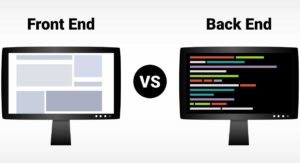A job at a prestigious company like Wipro can be a game-changer for aspiring software developers. Wipro, a global leader in IT services, consulting, and business solutions, offers many growth and professional development opportunities. Preparing for a Wipro interview can be daunting, but with the right strategy, you can significantly increase your chances of success.
This article provides a valuable guide to a successful software developer interview at Wipro. It covers everything from understanding the company and its recruitment process to tackling common Wipro interview questions and answers. It also shares a web development program to help hopeful software developers gain practical skills and a certificate to attest to their qualifications.
What is Wipro?
Wipro Limited is an India-based multinational corporation that offers various services, including consulting, information technology, and business processes. Established as a vegetable oil manufacturer in 1945, Wipro has grown into one of the world’s leading IT services companies, operating in over 50 countries with more than 220,000 employees. Wipro’s commitment to innovation, sustainability, and community initiatives has earned it a reputation as a responsible and forward-thinking organization. The company serves diverse industries, including healthcare, banking, retail, and energy, offering solutions that leverage cutting-edge technologies like cloud computing, machine learning, and artificial intelligence.
Also Read: Job Prep: Nvidia Interview Questions and Answers
Understanding the Wipro Recruitment Process
Wipro has offices in over 50 nations, so recruitment processes may vary according to local laws. However, the software developer recruitment process has certain common elements broken down into stages designed to assess technical and non-technical skills. Here’s a breakdown of the typical steps you can expect when looking to get hired:
#1. The Online Application: First, submit your application through Wipro’s career portal. Ensure your resume is updated and highlights relevant skills and experiences. You can use their advanced job search to apply for the position that best suits your profile. If you don’t find a suitable position immediately, upload your resume or CV anyway, and a recruiter may contact you when something opens.
#2. The Tests: Next comes a round of testing to evaluate your technical and functional abilities. These include:
- Aptitude Test: This test evaluates your quantitative, logical reasoning, and verbal abilities. It’s essential to practice these kinds of questions beforehand to get the best performance results.
- Technical Test: This interview, conducted by a panel of senior developers, delves deeper into your technical knowledge, including data structures, algorithms, databases, and software engineering principles.
#3. The Interviews: Next come the interviews. You will meet with technical and talent acquisition teams for this stage. This includes the following:
- Technical Interview: This interview, conducted by a panel of senior developers, delves deeper into your technical knowledge, including data structures, algorithms, databases, and software engineering principles.
- HR Interview: This stage assesses your fit with Wipro’s culture and values. Expect questions about your background, career aspirations, and why you want to work at Wipro.
#4. The Documentation: Once you pass your interviews, you’ll need to deal with paperwork. Send the needed documentation to the company to negotiate a competitive offer. The HR contact will provide you with a list of the required documents.
#5. The Offer: After you complete the previous stages, you’ll receive an offer letter. Confirm your acceptance and, if applicable, begin your notice period with your existing employer.
#6. The Onboarding. The onboarding process involves the recruiting team verifying your qualifications and completing background checks. Once this is done, you will finish any necessary documentation and familiarize yourself with Wipro’s policies and procedures. Welcome aboard!
Also Read: Who is a Web Designer? Exploring the Role, Demand, and Skills
Wipro Interview Rounds
There are three selection rounds in the Wipro recruitment process:
- Online testing
- Technical interviews
- Human resources (HR) interviews
The online assessment test is the first step in Wipro’s employment process. Candidates who pass this phase will be invited for technical interviews, where they will be evaluated for several skills and qualities, including:
- Aptitude. The aptitude test is the first step in this phase.
- Quantitative Skills. This phase examines your arithmetic skills, including number series, speed and distance, permutation and combination time, probability, simple and compound interest, ratios and proportions, percentages, and time.
- Logical Reasoning. This section assesses your critical and logical reasoning abilities, covering problems related to assertions and conclusions, coding, data interpretation, data sufficiency, data layouts, decoding, inequalities, logical word sequence, series, analogies, and visual reasoning.
- Communication. This phase assesses your English fluency. The questions cover sentence completion and improvement, error-spotting, para-jumbles, etc.
- Essay Writing. This section includes an essay writing test, where you must submit an essay of around 400 words on the chosen topic. An excellent essay is characterized by sound structure, organization, grammar, spelling, punctuation, and vocabulary.
- Coding. You can choose to take this test in Java, C, Python, or C++. You must know the basics of at least one of these programming languages. This round typically includes two or three coding problems.
Note that depending on specific company criteria and job outlines, experienced candidates may be able to bypass the online evaluation step.
Sample Wipro Interview Questions and Answers
Let’s examine a random sample of 20 Wipro interview questions and answers, broken down into Basic, Intermediate, and Advanced. These questions are a modest sample of the wide variety of queries you may encounter.
Basic Wipro Interview Questions
Q: What are the functionalities of an operating system?
A: The functionalities are:
- Providing a user interface, graphical user interface (GUI), and command line
- Providing functionality for booting up the system
- Managing peripheral devices
Q: List some JavaScript features.
A: Features include:
- Cross-platform
- Open-source
- Lightweight
- Interpreted programming language
- Complementary to Java
- Complementary to HTML
Q: What is C#?
A: It’s a simple general-purpose programming language developed by Microsoft. It’s a managed and safe language compiled by the .NET framework to generate Microsoft intermediate language.
Q: What is SQL?
A: SQL stands for Structured Query Language. It is used to maintain relational databases and perform extensive data manipulation operations.
Q: What’s a class in data?
A: A class is a user-defined data type containing the data members and member functions, with access defined by three modifiers: public, private, and protected.
Q: Why do you want to work with Wipro?
- A: If you’re asked this kind of question, it’s time to show off your research. Mention Wipro’s status as a top IT company, its reputation for having a good work environment, and its solid track record for innovation and success.
Also Read: Git Rebase vs. Merge: Workings, Differences, and Similarities
Intermediate Wipro Interview Questions
Q: What are window objects used for?
A: Window objects are objects created automatically by the browser to represent the browser’s window and are used to display pop-up dialog boxes.
Q: What are the differences between public, static, and void?
A: The differences between public, static, and void are:
- Public declared variables can be accessed anywhere
- Declared static variables are globally accessible without creating class instances
- Void is a modifier that specifies a method that doesn’t return any value
Q: Define polymorphism.
A: Polymorphism means having multiple functions with the same name but different functionalities. It’s divided into two categories:
- Static polymorphism
- Dynamic polymorphism
Q: Define abstraction.
A: Abstraction shows essential details without representing implementation. If members are defined with a public keyword, the members are accessible to the outside. If members are defined with a private keyword, they aren’t accessible outside.
Q: What’s a stack?
A: Stacks are ordered lists where you can perform insertions and deletions only at the top. It’s a recursive data structure with a pointer to its top element. Stacks are often called Last-In-First-Out (LIFO) lists, with the element inserted in the stack first being deleted last from the stack.
Q: What’s an attribute?
A: Attributes refer to a database component and are defined as the entity’s characteristics. of the entity, which the attributes can uniquely identify. Attributes represent the instances in the database’s row.
Q: List some advantages of a DBMS.
A: Advantages of a database management system include:
- Ensuring data consistency
- Easy accessibility
- Enforcing integrity constraints
- Providing multiple user interfaces
- Redundancy control
- Restricting unauthorized access
- Providing easy backup and recovery
Q: What’s a linear data structure?
A: Linear data structures have data elements arranged sequentially, and each member element is connected to the previous and subsequent elements. These data structures are straightforward to implement because computer memory is sequential.
Examples: Array, List, Queue, Stack, etc.
Also Read: Is Python Object-Oriented?
Advanced Wipro Interview Questions
Q: Can you overload the main () method?
A: Yes, you can use method overloading to have any number of main methods in a Java program.
Q: How do you perform a search operation?
A: Begin your search from the root node. If the data is less than the key value, look for the element in the left subtree.
Q: What’s a super keyword used for?
A: Super keyword uses are:
- Invoking the immediate parent class method
- Referencing to the immediate parent class instance variable
- Invoking the immediate parent class constructor
Q: List some tree-data structure applications.
A: Applications of the tree data structure include:
- Constructing symbol tables
- Manipulating arithmetic expression
- Hierarchal data models
- Syntax analysis
Q: What are the data structures used in BFS and DFS algorithms?
A: The data structures used in BFS and DFS algorithms are:
- Queue data
- Stack data
Q: Name the advantages of selection sort.
A: Advantages include:
- It’s easy to implement
- It’s useful for small data sets
- It’s more efficient than a bubble sort
The Technical Interview
Applicants who pass the online assessment will be contacted for a technical interview. The technical interview assesses your technical talents and relates them to the technical knowledge needed for the position you’re applying for. Your numerical thinking and problem-solving abilities will be tested. In addition to technical expertise, interviewers want to know how candidates create their thought processes, approach challenges, and demonstrate personal skills like communication.
The face-to-face technical interview is the most important step in the process. Candidates must define certain computer basics to the interviewer, such as CN, DBMS, OOPS, and OS. Although you don’t need to be fluent in every programming language, you should be familiar with at least one, such as C++, Java, or Python. Make sure you can program in at least one of those languages. You may also be asked to write code. The interviewer will assess how skilled you are at finding solutions to challenging problems, and you’ll also be asked about previous projects and work experiences.
Your number of technical interviews depends on your job description, previous round results, and employer requirements.
Also Read: What is Object-Oriented Programming? Definition, Pros, Cons, and Applications
The HR Interview
Every company conducts an HR interview round to evaluate your assets, character, shortcomings, and capability to complete an assignment. HR will also assess your background and experience and determine your best fit. They may also quiz you about Wipro’s history, like when it was founded, its goals and beliefs, and its structure. Review your resume or CV to ensure your information is accurate and up to date.
Technical Round Interview Questions
As a bonus, here’s a sampling of typical questions in the technical interview round. Conduct your research and find the answers. It’s a good way to practice for the real thing.
- What are multitasking and multiprocessing?
- How do you create a trash collection request in Java?
- What makes a macro in C programming language faster than a function?
- What are the advantages and disadvantages of time slicing in OS CPU scheduling?
- What do you know about Java’s order of precedence and associativity, and how do you use it?
- Distinguish between aggregate and composition in Java.
- Explain the terms precondition and postcondition in C++ programming language.
- Can you explain C++’s Stack Unwinding?
- Locate the nth Fibonacci number in O(n) time and O(1) space
- What are the steps used for creating a complete software package?
- What are the various kinds of Linux Shells?
- What are the pros and cons of indexing in relational databases?
- What is the difference between SQL’s DROP, TRUNCATE, and DELETE commands?
- What exactly is SQL Profiler?
- What are the plusses of hybrid cloud computing?
- What is EUCALYPTUS in cloud computing? List some of its capabilities.
- Explain the project management life cycle approach.
- What separates an HTML block-level element from an inline element?
- How do you sort an array’s elements in ascending order?
- Explain the fundamental differences between the LocalStorage and SessionStorage objects in HTML.
- What purpose does a CSS preprocessor serve, and when do you think a preprocessor should be used in a project?
- What precisely is a stored procedure?
- What are the benefits of using threads? What does it mean to multithread?
Tips for Wipro Interview Preparation
These tips are helpful not only for Wipro but also for any organization you’re interviewing for.
- Research the industry and the company. Nothing impresses an interviewer more than a candidate who takes the time to research the company. Interviewers might ask your opinion of his company’s position in its industry, who their competitors are, etc. Avoid trying to thoroughly explore a dozen different sectors. Instead, focus your employment research on a select few fields.
- Include your selling points and motivations for applying. Consider a handful of selling points for each interview, like why you’re the best candidate, preparing an example of each selling point. Also, be ready to tell the interviewer why you want the position, giving specific examples. No matter how experienced you are, if an interviewer feels you’re not genuinely interested in the job, they won’t offer it to you.
- Anticipate the interviewer’s concerns. Typically, there are more job applicants than available openings. Thus, interviewers look for ways to narrow the field of candidates. Put yourself in their place and try to figure out why they would be hesitant to recruit you, then come up with hypothetical counterarguments.
- Prepare for typical interview questions. That’s why you’re reading this article, right? Consider these questions and ones from other sources (e.g., books, magazine articles), and compose a list of the most likely ones you’ll face, considering your experience, age, background, and desired position. Write down your responses so you won’t get caught short during the interview.
- Prepare questions for the interviewer. Why should the interviewer be the only one asking questions? Come equipped with thoughtful questions that show your understanding of the organization and your sincere interest and intent. So, when the interviewer asks, “Do you have any questions?” you will be ready with a couple. By doing so, you show an interest in the organization.
Also Read: Breaking Down the Software Development Process
Do You Want to Take Your Interview Preparation to the Next Level?
Nailing a Wipro interview requires a winning mix of technical prowess, problem-solving skills, and a solid understanding of the company’s culture and values. Naturally, you will need the technical knowledge and skills to give the best answers to Wipro interview questions. Consider this online full stack web development program to gain those and earn an industry-recognized certificate.
Stay confident, be honest about your work experience, and show interest in technology and continuous learning. Good luck!
You might also like to read:
What is Software Testing in Software Engineering?
What is Unit Testing in Python?
React Interview Questions and Answers for Software Developers
What is Code Review? Definition, Importance, Types, and Tips






